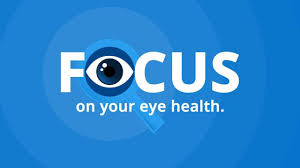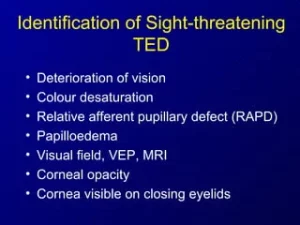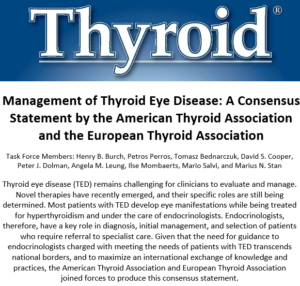TED is an autoimmune disease in which the eye muscles and fatty tissue behind the eye become inflamed. This inflammation can push the eyes forward (“staring” or “bulging”) or cause the eyes and eyelids to become red and swollen. In some individuals, the inflammation may involve the eye muscles, causing the eyes to become out of line, leading to double vision. In rare cases, TED can cause blindness from pressure on the nerve in the back of the eye or ulcers that form on the front of the eye (cornea).
TED is an autoimmune disease, meaning that the inflammation and scarring are caused by an attack from the body’s immune system. TED is primarily associated with an over-active thyroid gland due to Graves’ disease, although it can rarely occur in patients with an under-active or normally functioning thyroid gland. About a quarter of patients with Graves’ disease develop TED before, during or after the diagnosis of a thyroid disorder. TED is also known as Graves’ orbitopathy (GO) or Graves’ eye disease (GED).
Smokers are two to eight times more likely to develop TED. Smoking causes vasoconstriction of the vessels.
The most common symptoms of TED include:
- Bags under the eyes
- Blurred/double vision
- Change of the eyes’ appearance (usually staring/bulging)
- Difficulty moving the eyes
- Dry or watery eyes
- Gritty feeling in the eyes
- Low tolerance of bright lights
- Pain in or behind the eye — especially when looking up, down, or sideways
- Redness of the lids and eyes
- Swelling or fullness in one or both upper eyelids
- Signs that your condition may be more due to TED include:
- Symptoms occur in the wrong season for hay-fever.
- Symptoms include eye ache/pain, especially with eye movement.
- You develop double vision. This is serious and is likely from TED.
Treatment of TED:
When symptoms of TED develop, they can be progressive for the first six to twelve months. So, early diagnosis and treatment is important to prevent the condition from worsening. For mild TED, artificial tear drops will help with dry eye relief. Selenium supplements can also be beneficial. For severe TED, steroids and/or orbital radiotherapy may be considered. Some patients with TED are left with permanent double vision or a change in the appearance of their eyes, for which surgery may be recommended. Surgery is typically performed as a part of rehabilitative therapy once the inflammation has resolved and may involve:
- Decompression surgery, which removes bone and soft tissue from behind the eye to create more space.
- Eye muscle surgery, which corrects severe double vision.
- Eyelid surgery, which improves the appearance and function of the eyelids.
Other recommendations for TED patients can include:
- Prism glasses for double vision
- High-dose steroid medications and/or radiation to improve inflammation and double vision
- Support groups/counseling to address the social and psychological effects of the appearance of the eyes
Patients can control the severity of TED symptoms by:
- Quitting smoking. TED treatments are less effective for current smokers.
- Taking selenium supplements, which are available over the counter.
- Maintaining normal levels of thyroid hormones. Test your blood regularly and follow your doctor’s instructions, including taking prescribed medications.


